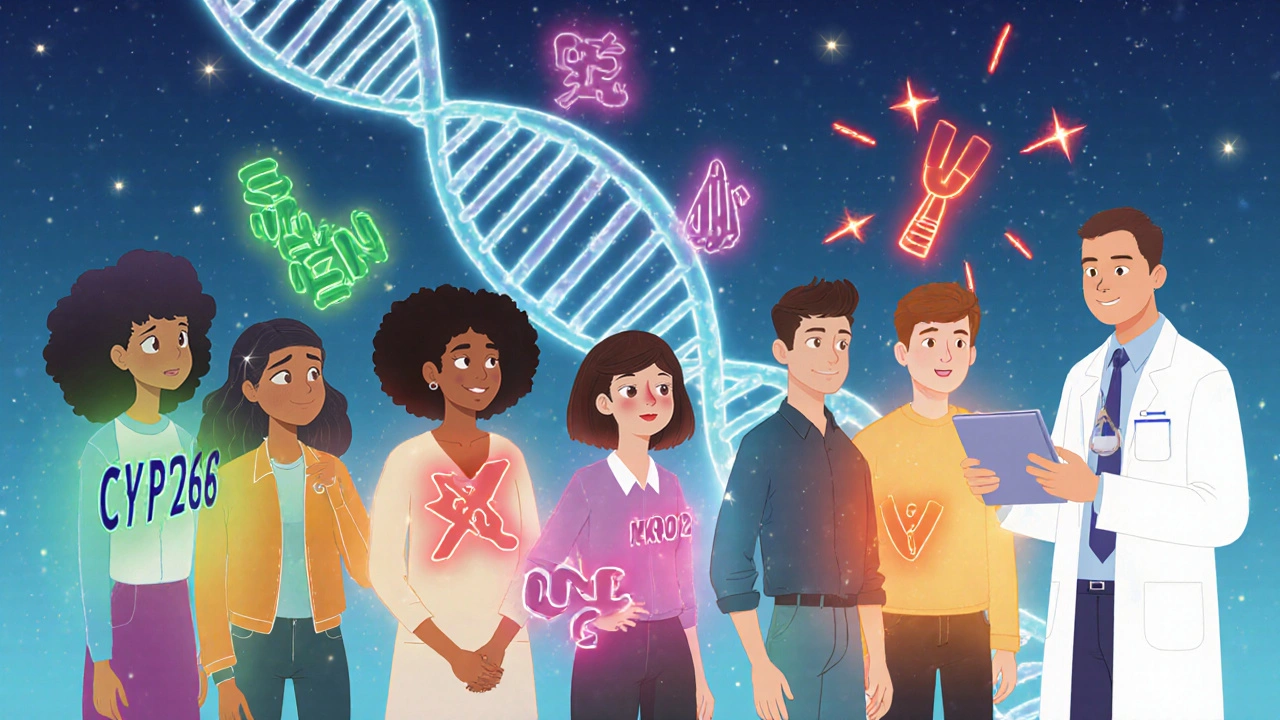
Drug Reaction Risk Checker
Check Your Risk
Risk Assessment
Low RiskSome people take a medication and feel fine. Others get sick-sometimes badly-from the same dose. It’s not always about how much you take. It’s often about your genes.
Why Some People React Worse to Medications
If you’ve ever heard someone say, ‘I can’t take that drug-it made me sick,’ and then another person says, ‘I take it every day and feel great,’ you’re seeing pharmacogenomics in action. That’s the science of how your genes affect how your body handles drugs. It’s not guesswork. It’s biology. And it’s changing how doctors prescribe medicines.
Your DNA holds instructions for proteins that break down drugs, carry them through your body, and let them bind to their targets. Even small changes in those genes can turn a safe drug into a dangerous one. For example, the CYP2D6 gene controls how your liver processes over 25% of common medications, including antidepressants, painkillers like codeine, and even tamoxifen for breast cancer. Some people have a version of this gene that breaks down drugs too slowly. Others break them down too fast. Both can cause serious side effects.
Key Genes That Change How Drugs Work
Three gene families stand out when it comes to drug side effects: metabolic enzymes, drug transporters, and drug targets. The most studied are the cytochrome P450 enzymes, especially CYP2C19, CYP2C9, and CYP2D6.
CYP2C19 poor metabolizers-about 2-5% of people of European descent and up to 15% of East Asians-can’t break down proton pump inhibitors like pantoprazole properly. That means the drug builds up in their blood. The FDA says these patients need lower doses, especially kids. Too much can cause low magnesium, irregular heartbeat, or even seizures.
CYP2D6 is even more dramatic. People with the ultrarapid metabolizer version turn codeine into morphine up to 50 times faster than normal. That’s why the FDA put a black box warning on codeine: breastfeeding mothers with this gene variant can pass dangerous levels of morphine to their babies through breast milk, leading to fatal breathing problems. On the flip side, poor metabolizers get no pain relief from codeine at all.
Then there’s HLA-B*15:02. This gene variant is common in people of Southeast Asian descent. If you have it and take carbamazepine or phenytoin for seizures, your risk of Stevens-Johnson Syndrome-a life-threatening skin reaction-goes up 100 to 150 times. The FDA now requires testing for this variant before prescribing these drugs in high-risk populations. The good news? If you test negative, your risk drops to nearly zero. That’s one of the strongest negative predictive values in medicine.
Warfarin, the blood thinner, is another example. Two genes-VKORC1 and CYP2C9-explain up to 40% of why people need wildly different doses. One person might need 5 mg a day. Another might need 1 mg. Get it wrong, and you could bleed internally or form a clot. Doctors now use genetic testing to start patients on the right dose, not the guesswork dose.
Cardiac Risks and Hidden Genetic Triggers
Some drug side effects aren’t obvious until it’s too late. Take QT prolongation-a heart rhythm problem that can lead to sudden death. About 5% of people who develop drug-induced torsades de pointes have a hidden genetic mutation linked to Long QT Syndrome. Genes like KCNQ1, KCNH2, and SCN5A are involved. These mutations often go unnoticed until a person takes a drug like certain antibiotics, antifungals, or antipsychotics that push their heart rhythm over the edge.
Even more surprising: researchers found that 2.2% of patients with severe drug-induced QT prolongation had mutations in the ANK2 gene. These weren’t classic Long QT mutations. They were rare, previously unknown variants that disrupted heart cell signaling. Without genetic testing, these patients would have been told, ‘It was just bad luck.’ But now we know: it was their DNA.

Why Some Side Effects Are Predictable-and Others Aren’t
Not all side effects are created equal when it comes to genetics. A 2024 study in PLOS Genetics looked at over 100,000 patients and found that cardiovascular side effects like arrhythmia, high blood pressure, and tachycardia are the most predictable. The positive predictive value? Nearly 30%. That means if your genes suggest you’re at risk, there’s a good chance you’ll actually have the side effect.
But gastrointestinal side effects? Nausea, diarrhea, stomach pain? Genetics explains less than 10% of those. Why? Because those are often caused by the drug’s direct irritation of the gut, not by how your body processes it. Your genes don’t control your stomach lining as much as they control your liver enzymes.
And then there’s the abacavir paradox. The HLA-B*57:01 gene variant predicts a severe allergic reaction to this HIV drug with near-perfect accuracy-if you have the gene, you almost never react. That’s 100% negative predictive value. But only 5-10% of people who carry the gene actually develop the reaction. So while testing prevents harm, it doesn’t mean everyone with the gene will get sick. Genetics gives you risk, not certainty.
What’s Being Done in Real Clinics
Hospitals aren’t waiting for perfect science. Vanderbilt’s PREDICT program started testing patients for 80+ pharmacogenetic variants back in 2011. When results came back, 65% of doctors changed their prescriptions-mostly to lower doses or avoid drugs entirely. One patient avoided severe nausea because her CYP2D6 status was known before starting tamoxifen. Her sister had suffered through it without testing.
At St. Jude Children’s Research Hospital, preemptive genotyping cut adverse drug reactions in kids by 33%. That’s huge. But adult hospitals? Slower. Only 10-15% of actionable gene-drug pairs are being used in routine care, according to the Clinical Pharmacogenetics Implementation Consortium (CPIC). Why? Doctors say they don’t have time to learn how to read the reports. Many don’t know what ‘intermediate metabolizer’ means. And electronic health records rarely alert them when a patient’s genes conflict with a prescribed drug.
Cost is another barrier. A full pharmacogenetic test runs $250-$500. Insurance often won’t cover it unless it’s for a specific drug like warfarin or clopidogrel. Medicare Advantage plans covered only 28% of preemptive testing in 2023. That means most people pay out of pocket-or don’t get tested at all.
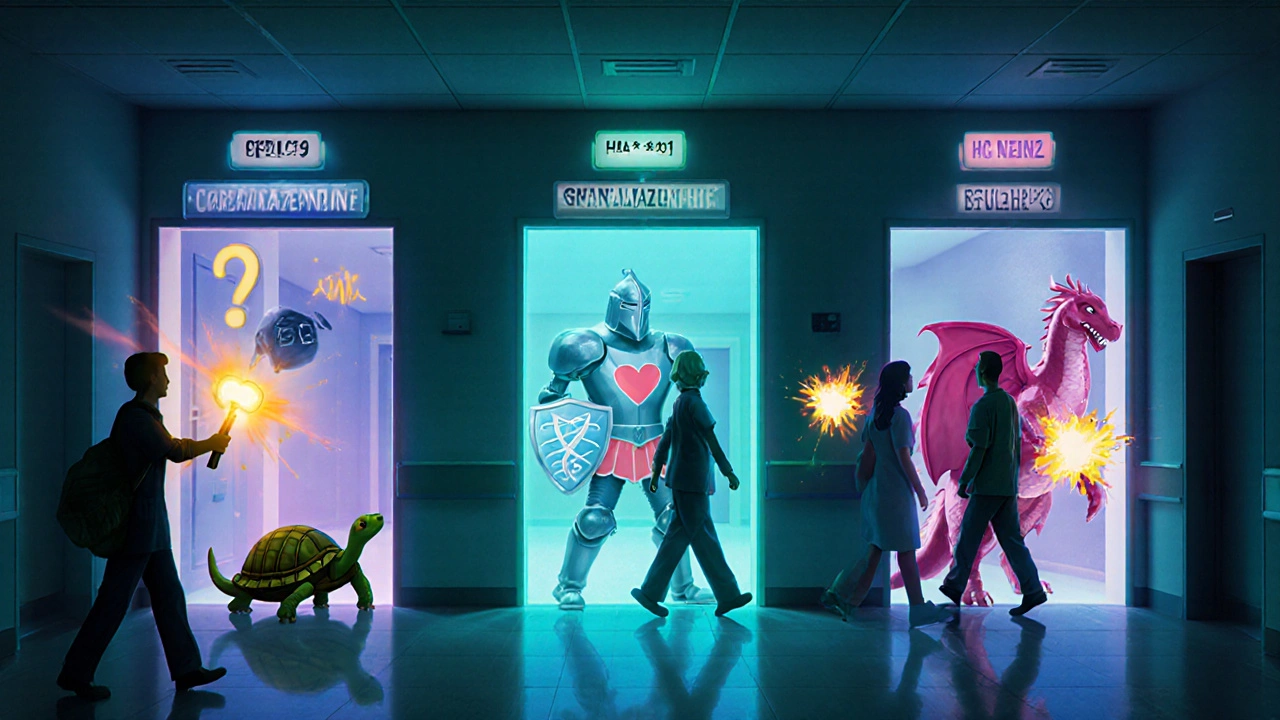
What’s Next: Whole Genomes and Better Tools
The future isn’t just testing one or two genes. It’s sequencing your whole genome once and using it for life. The eMERGE Network found that 91% of people have at least one actionable pharmacogenetic variant hidden in their DNA. That means a single test could prevent dozens of side effects over a lifetime.
Researchers are also building polygenic risk scores-combining dozens of small genetic signals to predict side effects like statin-induced muscle pain. One 2024 study showed a 15-gene score predicted muscle damage with 82% accuracy, far better than checking just SLCO1B1 alone.
The FDA is pushing for more. By 2027, they may require genetic testing for 35+ drugs. The All of Us program has already returned results to over 200,000 Americans, finding that 42% carry at least one variant that affects drug response. But there’s a problem: 95% of past genetic studies were done in people of European descent. African populations have 30% more genetic diversity, yet they’re underrepresented. That means tests may miss risks in non-European groups-or give false reassurance.
What You Can Do
If you’ve had a bad reaction to a drug-or if a close relative has-ask your doctor about pharmacogenetic testing. It’s not magic. But it’s science that’s already saving lives. You don’t need to be sick to get tested. Some people get tested before starting any new medication, especially if they’re on multiple drugs.
Don’t rely on direct-to-consumer tests like 23andMe for medical decisions. They don’t test all the right variants, and they don’t give clinical interpretations. If you want real results, go through a doctor or clinic that works with a clinical lab and has a pharmacogenomics expert on staff.
And if you’re a patient: keep a list of every drug you’ve taken and how you reacted. That history is gold. It helps your doctor decide if your side effect is genetic-or something else.
Why This Matters More Than You Think
Every year, adverse drug reactions send over 1 million Americans to the hospital. Many of those are preventable. We’ve known for decades that genes matter. Now we have the tools to use that knowledge. The question isn’t whether pharmacogenomics works. It’s whether we’ll use it before the next person gets hurt.
Can genetic testing prevent all drug side effects?
No. Genetics explains only part of the story. Other factors like age, liver or kidney function, other medications, diet, and even gut bacteria play big roles. But for certain drugs and side effects-like severe skin reactions or heart rhythm problems-genetic testing can prevent them almost entirely if used correctly.
Is pharmacogenetic testing covered by insurance?
Sometimes. Medicare and most private insurers cover testing for specific drug-gene pairs, like CYP2C19 for clopidogrel or CYP2D6 for tamoxifen. But preemptive testing-testing before you even need a drug-is rarely covered. Out-of-pocket costs range from $250 to $500. Check with your provider and ask if your test is medically necessary.
What if I already took a drug and had a side effect?
It’s not too late. Genetic testing can help explain why it happened and guide future prescriptions. For example, if you had a bad reaction to codeine, testing for CYP2D6 could prevent you from being prescribed another opioid that’s metabolized the same way. Your doctor can use that info to avoid similar drugs in the future.
Do I need to get tested more than once?
No. Your genes don’t change. Once you’ve been tested, the results are valid for life. You can share them with any future doctor. The challenge isn’t repeating the test-it’s making sure your medical records include the results and that your providers know how to use them.
Are direct-to-consumer genetic tests like 23andMe reliable for drug reactions?
Not for medical decisions. These tests screen for a limited number of variants and often lack clinical context. For example, 23andMe reports on CYP2D6, but doesn’t interpret complex results like ultrarapid or intermediate metabolizer status. Relying on them could lead to dangerous mistakes. Always confirm results with a clinical lab and a healthcare provider trained in pharmacogenomics.

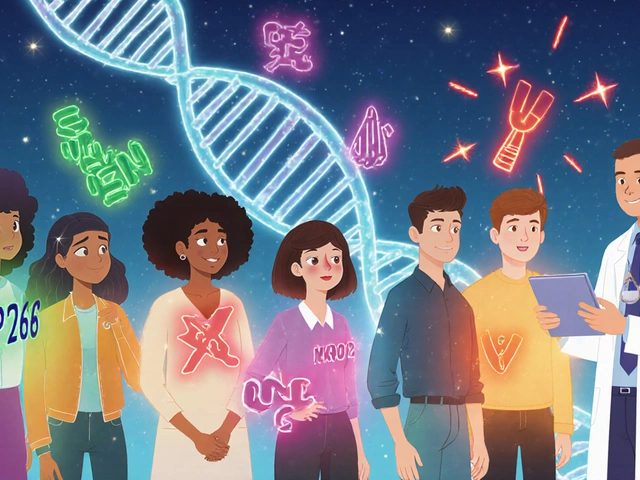
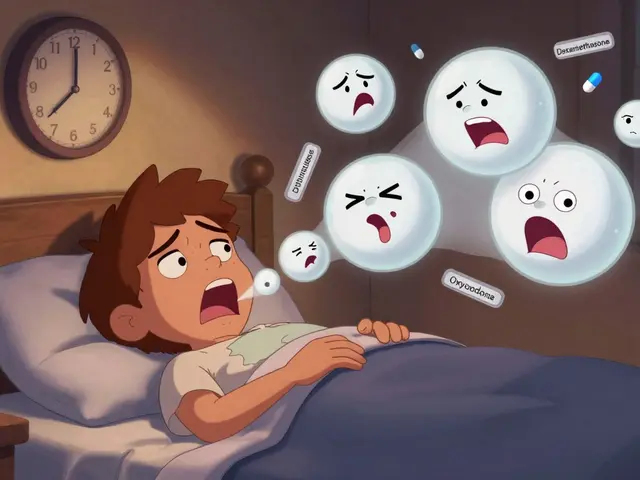
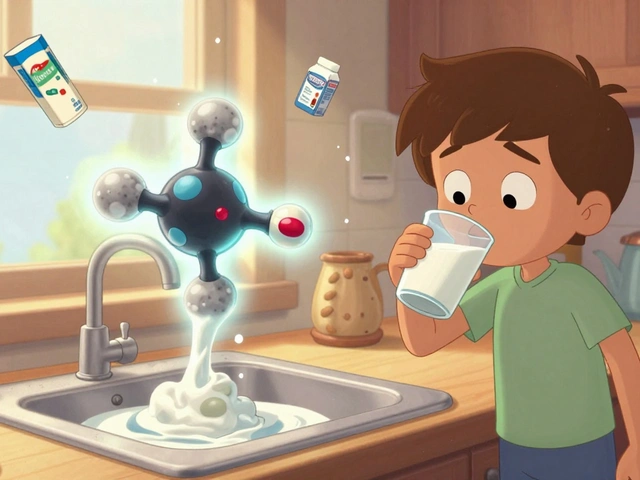


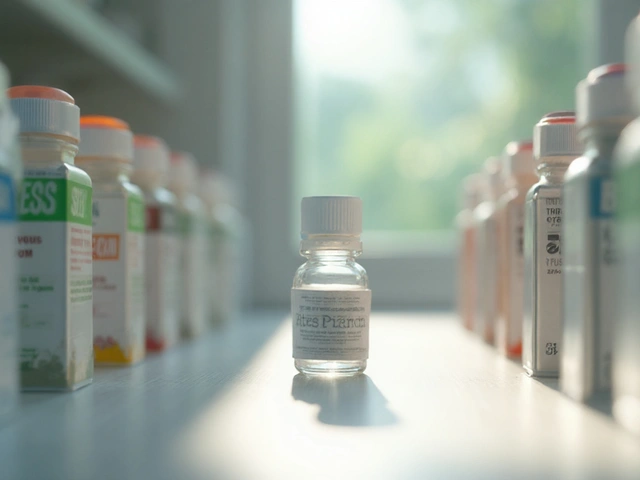

I’ve been on 7 different meds in the last 3 years and every single one gave me nausea or dizziness. My doctor just said ‘try another’ until I finally demanded a genetic test. Turns out I’m a CYP2D6 poor metabolizer. No one ever asked. No one ever cared. Now I know why my body hates pills.
This is life-changing info. In India, we’re still prescribing warfarin based on ‘average doses’-people bleed or clot because no one tests. My cousin had a stroke after being on clopidogrel for 3 months. If we’d known her CYP2C19 status, it could’ve been avoided. We need this in public health systems, not just private clinics.
They’re lying to you. This isn’t science-it’s Big Pharma’s new scam. They want you to pay $500 for a test so they can sell you ‘personalized’ drugs that cost 3x more. Meanwhile, the real cause of side effects? Toxic additives, fillers, and corporate greed. Your genes? A distraction. They don’t want you to know how dirty the system is.
It’s fascinating how we’ve spent centuries blaming the patient for ‘not tolerating’ a drug, when the real culprit was always written in their DNA. We’ve been treating biology like a black box-now we’re finally cracking the code. But the ethical question remains: if your genes predict harm, does that make you ‘high risk’ in the eyes of insurers? Who owns your biology?
In Nigeria, we rarely test for these variants-but we’ve seen the outcomes. Many patients die from carbamazepine reactions because testing isn’t available. We need global equity here. Genetic data from African populations is not just underrepresented-it’s ignored. This isn’t just medicine. It’s justice.
So let me get this straight-we’re gonna spend half a grand to avoid a side effect that might happen to 1 in 100 people, while the FDA approves 20 new antidepressants that all cause weight gain and libido loss? This is like buying a bulletproof vest because you’re mildly afraid of pigeons. We’re optimizing for rare edge cases while ignoring the epidemic of overmedication.
Look, I’ve read the CPIC guidelines. I’ve seen the papers. But here’s the truth: most doctors can’t interpret a CYP2D6 result if their life depended on it. They see ‘intermediate metabolizer’ and just prescribe the standard dose. This isn’t a genetic revolution-it’s a bureaucratic failure wrapped in fancy jargon.
While the science is compelling, the practical implementation remains fraught. The current EHR systems are not interoperable with pharmacogenomic data. Without standardized coding (e.g., LOINC, SNOMED CT), the results are siloed. Until clinicians are trained and systems are integrated, this remains theoretical.
My mom took statins for 12 years. Never had muscle pain. I took them for 6 weeks and couldn’t walk. Same dose. Same age. Same diet. My 23andMe said I had the SLCO1B1 variant. I stopped. Instant relief. Why wasn’t I tested before? Because no one thought to ask. It’s not magic. It’s just… obvious.
If your genes tell you you’re at risk, does that mean you’re broken? Or is the drug broken? We treat people like defective machines instead of asking: why are we forcing everyone through the same narrow pipeline? Maybe the problem isn’t the patient. Maybe it’s the one-size-fits-all model of medicine. We’re not just misreading DNA-we’re misunderstanding humanity.
The notion that genetic testing is a panacea is dangerously naive. The FDA’s black box warnings exist because the system is reactive, not proactive. Testing doesn’t prevent adverse events-it merely shifts liability from the manufacturer to the patient. And who pays for the test? The uninsured. The underinsured. The poor. This isn’t progress. It’s privatized risk.
So now we’re gonna test everyone’s DNA before giving them a pill? What’s next? Mandatory genome scans before you get a flu shot? I’m sorry but I’m not handing over my genetic code to some corporate lab so a doctor can ‘optimize’ my Tylenol. My grandma took aspirin for 50 years and lived to 94. Maybe we should stop overcomplicating things.
They’re using your genes to track you. This isn’t medicine-it’s surveillance. Once they have your DNA, they’ll sell it to insurers, employers, even the government. Next thing you know, you’ll be denied a job because your CYP2D6 profile says you might get sick on shift work. Wake up. This is the beginning of genetic discrimination.
Let’s be real: we’re talking about a handful of genes that matter for a few drugs. But the system is acting like this is the new gospel. Meanwhile, people are dying from opioid overdoses, antibiotic resistance, and lack of access to basic care. We’re putting a gold-plated lock on the front door while the whole house is on fire. Priorities, people.
My doctor didn’t even know what CYP2C19 meant. I had to print out the CPIC guidelines and hand them to him. He thanked me. Then he prescribed the same drug anyway. That’s the real problem. Not the science. The system.